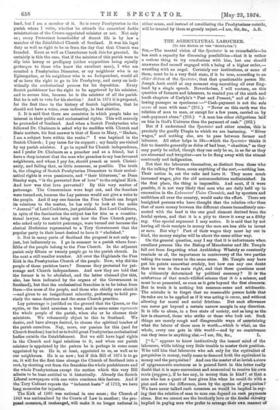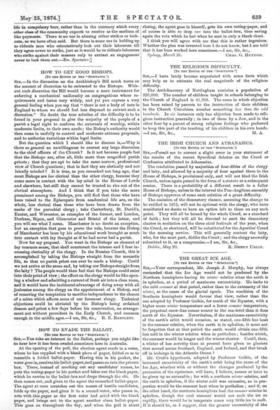THE AGRICULTURAL LABOURER.
[TO THE EDITOR OF THE " SPECTATOR."]
Stu,—The mental vision of the Spectator is so remarkable—he has such a capacity for discerning possibilities—that it is rather a serious thing to try conclusions with him, lest one should unawares find oneself engaged with a being of a higher order,— wrestling with an angel. Certainly our institutions, or some of them, must be in a very fluid state, if it be true, according to an °biter dictum of the Spectator, that that questionable person Mr. Joseph Arch could at any moment stop recruiting all over Eng- land by a single speech. Nevertheless, I will venture, on this question of farmers and labourers, to remind you of the ninth and tenth chapters of Carlyle's "Past and Present," and of the fol- lowing passages as specimens :—" Cash-payment is not the sole nexus of man with man." (251.) "Never on this earth was the relation of man to man, or except for a few years, carried on by cash-payment alone." (253.) "A man has other obligations laid on him in God's Universe than the payment of cash." (262.)
But if I understand the Spectator and other oracles, this is precisely the goodly Utopia to which we are hastening. "Silver wages," and nothing else, are to pass between farmer and labourer. All other helps in life—which the Spectator thinks it fair to describe generally as doles of bad beer, "charities," as they may partly be called, though they can only be so, in so far as they are abnormal and irregular—are to be flung away with the utmost contumely and indignation.
Not that the labourers themselves, as distinct from those who- do the talking for them, mean anything of the sort,—nothing less. Their notion is, eat the cake and have it. They mean much increased wages, plus the old accommodations undiminished. In the first place, the thing is impossible. And next, if it were possible, it is not very likely that men who are daily held up to execration in the Labourers' Union Chronicle, and by spouters and scribblers all over the country, would make the effort. There are benighted persons who have thought that the relation other than that of mere money between the different classes immediately con- nected with the land is the one good element derived from the feudal system, and that it is a pity to throw it away as a filthy rag. One special argument I may notice. It is said that by not having all their receipts in money the men are less able to invest or save. But why ? Part of their wages they must lay out in kind, the money surplus will be about the same either way.
On 66 general question, may I say that it is unfortunate when. excellent persons like the Bishop of Manchester and Mr. Temple fall out from forgetting what Archbishop Whately so constantly reminds us of, the importance in controversy of the two parties taking the same terms in the same sense. Mr. Temple may have- put his points somewhat crudely, but how can any one doubt that he was in the main right, and that these questions must be ultimately determined by political economy ? It le the• misfortune of that much-vilified science that it is a science, and must be so presented, as soon as it gets beyond the first elements. But in truth it is nothing but common-sense and arithmetic. The mistake is to forget that no reasonable person holds that its rules are to be applied as if it was acting in yam, and without allowing for moral and social frictions. But such allowance can never get beyond a certain narrow margin in any direction. It is idle to abuse, in a free state of society, and as long as the law is observed, those who strike or those who lock out. Such things are merely rough and disagreeable ways of ascertaining what the labour of these men is worth—which is what, on the whole, every one gets in this world—and by no contrivance
can they issue in anything else.—I am, Sir, &c., L.
[" L." appears to know instinctively the inmost mind of the labourers, while taking very little trouble to master their position.. Whotold him that labourers who ask only for the equivalent of perquisites in money, really mean to demand both the equivalent in money and the perquisites? And can the master of so lavish a store- of epigrammatic sentences as is poured forth in this letter really doubt that it is more convenient and economical to receive his own- rents (suppose), if he has any, in money than in kind? or that a man who has a quart of beer given him when he could do with a pint and save the difference, loses by the system of perquisites?' We have never talked such nonsense as would be implied in say- ing that the relation of man to man can depend on cash payments alone. But we cannot see the brotherly love or the feudal chivalry implied in paying men who prefer to arrange their own manner of life in compulsory beer, rather than in the currency which every -other elms of the community expects to receive as the medium of like payments. There is no use in abusing either strikes or lock- outs, as we have often said. But there is some use in holding up to ridicule men who ostentatiously lock out their labourers till they agree never to strike, just as it would be to ridicule labourers who strike against their masters only to extract an engagement never to look them out.—En. Spectator.]



































 Previous page
Previous page